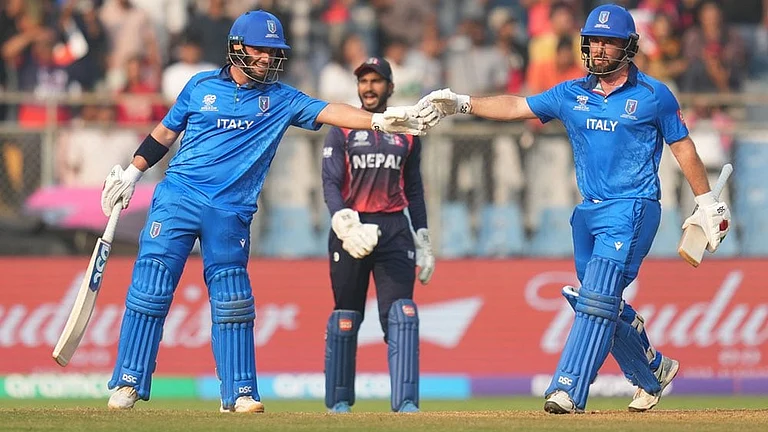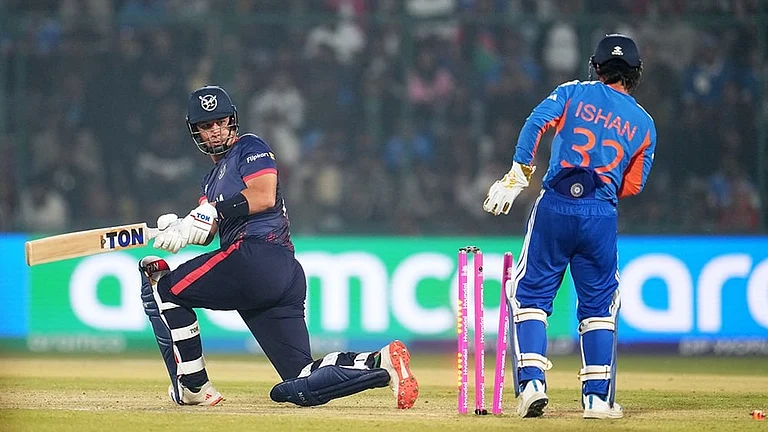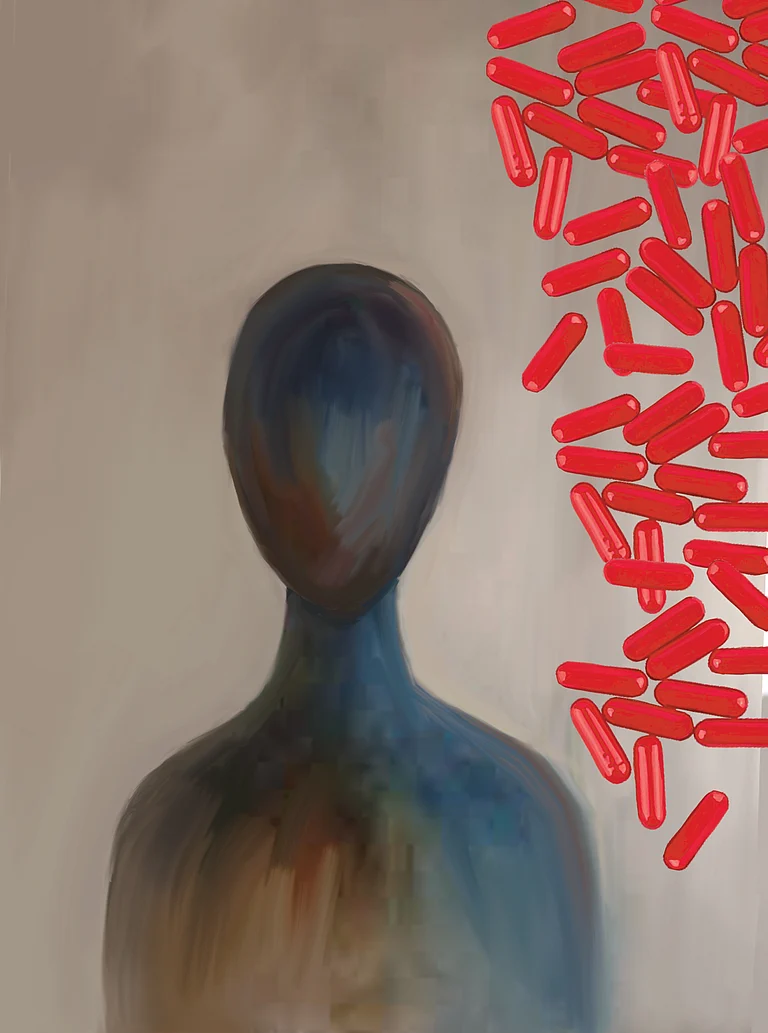“Can I lay claim to (the legacy of) being the only transgender person to head a Covid-19 vaccination centre in India?” Dr Aqsa Shaikh recently mused on Twitter. Since then, her timeline has been inundated with strangers and acquaintances alike, congratulating and encouraging her.
A community medicine specialist, an associate professor at Jamia Hamdard, author and of late, the nodal officer of the Covid-19 vaccination centre at Hamdard Institute of Medical Sciences and Research (HIMSAR), Dr Shaikh dons many hats. Growing up in Mumbai’s Malad, Dr Shaikh struggled with identity issues ever since she was a young boy and stereotypical, negative reinforcements of the transgender community from those around only furthered her mental trauma. But epitomizing the saying, "However many storms are within you, there is always room for more,” Dr Shaikh, previously known as Zakir Hussain, has never turned down any opportunity to take adversity in her stride.
Speaking to Outlook’s Intifada P. Basheer, Dr Shaikh discusses the impact the pandemic has had on the transgender community, the need for furthering inclusivity in the Indian healthcare sector, her work as a co-investigator of Russia’s Sputnik V vaccine trials and much more. Excerpts:
Q) The Covid-19 pandemic has once again focused the spotlight on the inequalities that plague our society, with the chasm widening between those who are privileged and those who are marginalised. Considering that, how has the pandemic affected the transgender community and what are the unique challenges they have had to face?
Yes, whenever we have a disease outbreak, the discrimination and stigmatisation the marginalised communities face, increase manifold. And we saw this occur during the Covid-19 pandemic as well. A case in point is the kind of stigmatisation the members of Tablighi Jamaat had to face and how the entire community was blamed for the spread of the virus and was made a scapegoat. Similarly, people from the north-east living in the mainland had to endure racial abuse as people associated them with China and held them responsible for the outbreak.
The trans community was no exception to such kind of stigma. Even pre-Covid, members of the trans community had to face a lot of historical and structural barriers while accessing healthcare. For many of them, it’s a task to even buy a dose of paracetamol from the chemist or consult a doctor for a basic check-up. And a huge portion of them belongs to the Hijra/Kinnar community, who are traditionally involved in professions such as sex work and begging—activities that came to a complete halt during the lockdown.
In addition to this, a lot of trans people, who faced conflicts with their natal families also had to face destitution. The fact that the government barely provided any support made matters worse. Furthermore, many trans persons, who were on transitional, gender affirmation services or on hormonal therapy, have completely been denied those services for the past one year.
So yes, the pandemic has had a disastrous impact on the trans community.
Q) Considering that you are the first and only trans person to helm a Covid-19 vaccination centre, is it too much pressure to handle?
Just because we are a member of the trans community, there are a lot of “firsts” we are lauded for, like for instance the first trans doctor, or the first trans researcher and so on. And to think that this is still the case in 2021—the fact that we still have these “firsts” to hand out, is very telling of our society and how it has restricted the trans community from becoming a part of the mainstream.
Having said that, I don’t want to be the last. I hope that through my work and through my visibility, I can open avenues for other trans persons to enter the education and healthcare sector.
And that’s something I have been working towards for a long time. For instance, I had recently filed a petition at the Delhi Commission For Protection of Child Rights and I was able to secure an order for a ban on unnecessary sex-change surgeries on intersex children. I am also on the advisory panel constituted by the Delhi government to look into transgender issues and transgender empowerment.
Q) Do you think the issues you mentioned before, such as social stigma and discrimination, will hinder the trans community from getting access to Covid-19 vaccines?
This is something we did deliberate upon before the vaccines were introduced in the country. One needs to understand that there are no barriers to the government’s vaccination programme. For instance, if you view the gender columns present on the inoculation appointment forms, apart from ‘male’ and ‘female’ there is the option of ‘other’. Also, most of the documents that are required for getting a vaccine, such as AADHAR and PAN cards, also make provisions for trans people.
However, having said that, we need to acknowledge that access to healthcare itself is not easy for many trans people. For instance, for someone from the Hijra community, the very act of entering a hospital, going past security, the reception and visiting the vaccination centre and using the washrooms in the facility will be a daunting task. So, even though there is no scope for discrimination in the vaccination programme, our entire healthcare system is designed in such a way that it is inaccessible to most trans people. And this is something we really need to work on.
Q) Tell us about your ‘TransCare: Covid-19’ campaign.
This is a research project being carried out by an NGO-- Sangath India. I am one of the co-investigators assigned to the project. Through it, we aim to investigate the kind of problems the transgender community has had to face in terms of access to healthcare during the pandemic across the country.
Q) From having dealt with severe depression and suicidal tendencies, at one point, to working towards creating awareness about mental health, has life come a full circle?
Once we go through that kind of pain, we emerge out of it stronger and it’s natural for us to work towards those causes. Yes, I suffered from severe depression and suicidal tendencies in the past and I was able to emerge out of it because of the timely medical support I received. So, I think it’s natural for me to connect with vulnerable communities, especially those with mental illnesses. So, yes that’s one of the areas that’s close to my heart.
Q) Currently you are also working as a co-investigator of the Sputnik V vaccine. Tell us a bit more about that.
At the moment, we are conducting bridging studies for the Sputnik V Covid-19 vaccine in India. This includes trials on the local populace. As part of that exercise, we are conducting trials on 3,000 volunteers and I am one of the co-investigators for the trials at HIMSAR.
Q) Lastly, what message do you have for those who are apprehensive about taking the Covid-19 vaccine
I think it is natural for people to be afraid of something new. But as someone who is involved in vaccine research, I took the vaccine on the very first day when they rolled it out for frontline workers. I have taken both my doses and all I would say is please take the shot if you are eligible to take it because it is one of the most important tools we have to end this pandemic.




















.png?w=200&auto=format%2Ccompress&fit=max)

.png?w=200&auto=format%2Ccompress&fit=max)



